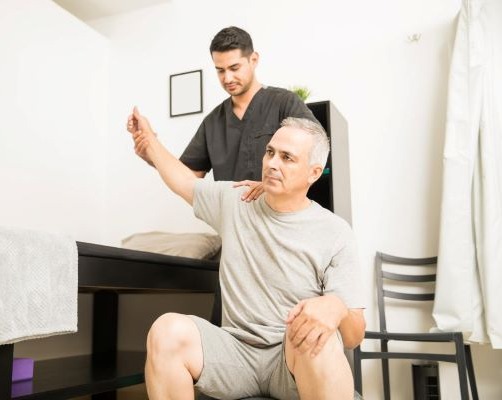Table of Contents A multifactorial approach to falls prevention Risk assessment Prevention of falls...

Initial Assessment
Your initial assessment will involve your therapist getting to know you, understanding what level you are at, and what goals are important to you.
Your therapist will gather information about any relevant medical history, your current abilities and challenges, and may complete a physical examination of your movement and function.
Together we will identify your personal priorities and your preferred focus for therapy.

Additional Assessment
Following your initial assessment, further specific assessments are likely to be required as part of your ongoing input. For example, this may include more in-depth assessment of a specific area such as movement range in your arm; or a standardised, formal assessment in an area such as cognition or falls risk.
You will continually be reassessed to monitor change and improvement, and this will be communicated with you throughout.

Goals
You will be supported to identify personal goals and discuss appropriate therapeutic interventions to enable you to work towards these goals. As part of ongoing assessment, progress towards your goals will be monitored.
Examples of goals could be anything from regaining your ability to sit up or walk, using the stairs and returning to sleep in your own bed, through to returning to hobbies, sports or work.
Someone who is falling may wish to
Someone who has had a stroke may wish to
Someone who has multiple sclerosis may wish to
Ongoing & Ending Therapy
Ongoing therapy: Therapy will be tailored to your personal goals and carried out in the most appropriate setting i.e., your home, workplace or out in the community. The frequency of therapy sessions will also be agreed with you. Where appropriate you will be supported to continue a home exercise or activity programme between therapy sessions to maximise therapeutic benefit.
Ending therapy: Your therapy will continue until your goals have been met or your potential has been reached. Your therapist will ensure there is a self-management plan in place to maintain or build upon improvements after discharge.

Table of Contents A multifactorial approach to falls prevention Risk assessment Prevention of falls...

One effect of this life-changing event, what is it and how to manage its widespread impact?

What is spasticity, why does it occur after stroke and what can be done about this problem?

Initial Assessment
Your initial assessment will involve your therapist getting to know you, understanding what level you are at, and what goals are important to you.
Your therapist will gather information about any relevant medical history, your current abilities and challenges, and may complete a physical examination of your movement and function.
Together we will identify your personal priorities and your preferred focus for therapy.
Additional Assessment
Following your initial assessment, further specific assessments are likely to be required as part of your ongoing input. For example, this may include more in-depth assessment of a specific area such as movement range in your arm; or a standardised, formal assessment in an area such as cognition or falls risk.
You will continually be reassessed to monitor change and improvement, and this will be communicated with you throughout.

Goals
You will be supported to identify personal goals and discuss appropriate therapeutic interventions to enable you to work towards these goals. As part of ongoing assessment, progress towards your goals will be monitored.
Examples of goals could be anything from regaining your ability to sit up or walk, using the stairs and returning to sleep in your own bed, through to returning to hobbies, sports or work.
Someone who is falling may wish to
"Feel more confident to go out into the back garden"
Someone who has had a stroke may wish to
"Hug my grandchild using both arms"
Someone who has multiple sclerosis may wish to
"Sit out of bed for meals"
Ongoing therapy
Therapy will be tailored to your personal goals and carried out in the most appropriate setting i.e., your home, workplace or out in the community. The frequency of therapy sessions will also be agreed with you. Where appropriate you will be supported to continue a home exercise or activity programme between therapy sessions to maximise therapeutic benefit.
Ending Therapy
Your therapy will continue until your goals have been met or your potential has been reached. Your therapist will ensure there is a self-management plan in place to maintain or build upon improvements after discharge.

Table of Contents A multifactorial approach to falls prevention Risk assessment Prevention of falls...

One effect of this life-changing event, what is it and how to manage its widespread impact?

What is spasticity, why does it occur after stroke and what can be done about this problem?